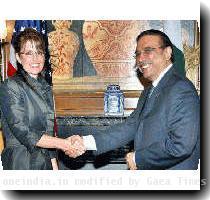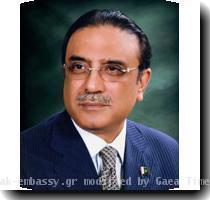Blasts in eastern Pakistan city kill up to 48 people, as militants avenge army offensive
By Babar Dogar, APMonday, December 7, 2009
Blasts in eastern Pakistan city kill up to 48
LAHORE, Pakistan — Twin blasts at a market in eastern Pakistan killed up to 48 people as militants struck back amid an army offensive against the Taliban, but the country’s president said the bombings would not deter the government in its campaign.
Meanwhile, a U.S. missile strike early Tuesday killed at least three people in a troubled northwestern tribal region near the Afghan border, two intelligence officials said.
More than 100 people were also injured late Monday in the bombings in Lahore. The bombs ripped through a market popular with women around 9 p.m. local time, igniting a massive fire.
Lahore’s top government official, Khusro Pervaiz, said there were 36 dead and about 100 wounded. However, local media reported Tuesday that 12 more people died overnight at hospitals, raising the death toll to 48.
Earlier Monday, a suicide bomber killed 10 people outside a courthouse in the northwestern city of Peshawar.
President Asif Ali Zardari said such cowardly acts of terrorism would not deter the government’s resolve to fight terrorism.
Monday’s attack in Lahore was timed to take place when the Moon Market, which sells women’s clothing, shoes and cosmetics, was at its busiest. Authorities initially said both bombs at the market were believed to be remote-controlled, but they later said a suicide bomber was suspected to have carried out at least one of them.
The blasts came within 30 seconds of each other, leaving dozens of cars and shops ablaze late into the night.
Many victims were women and children, including a dead 2-year-old, a police officer said.
“There was a blast. Then there was another,” said Mohammad Nauman, who was bleeding from his nose. “Nobody knew what was happening. Everybody was running. There was fire everywhere.”
Most of the militant attacks in recent weeks have been directed at security forces, though several have targeted crowded public spaces such as markets, apparently to create public anger and increase pressure on the government to halt its offensive on the Taliban in South Waziristan, a tribal region bordering Afghanistan where al-Qaida has also proliferated.
The attacks by militants have killed more than 400 people since the beginning of October, including 112 in a Peshawar market frequented by women. That attack occurred while U.S. Secretary of State Hillary Rodham Clinton was visiting Pakistan.
The Taliban generally claim responsibility for attacks killing security officers, but they do not acknowledge carrying out those targeting civilians. Government officials and security analysts say there is little doubt the militants are behind all the attacks.
Lahore is Pakistan’s second-largest city. It has been hit several times by militants over the past year, including an attack on the visiting Sri Lankan cricket team and several strikes against security installations.
By attacking Lahore, militants are bringing their war to the heart of Pakistan. The city is the capital of Punjab, Pakistan’s most populous province, and is considered the political and cultural center. It is also home to many army regiments because of its location next to the border with India, Pakistan’s longtime foe.
The attacks came hours after a suicide bomber killed 10 people outside a courthouse in Peshawar, a northwestern city that has been repeatedly hit by bombings since October. It lies on the main road leading to the border region, much of which is under the control of al-Qaida and the Taliban.
The U.S. has waged its own campaign of missile strikes against militant targets in the border region. The latest such suspected strike destroyed a car carrying three people in a village near Mir Ali, which is a main town in North Waziristan. The identity of the dead was not immediately known, said two intelligence officials.
The officials spoke on condition of anonymity because they were not authorized to speak to the media.
The turbulence in the country has coincided with rising speculation over the future of Zardari.
On Monday, the Supreme Court began examining the legality of an amnesty protecting him and 8,000 other officials from graft prosecution. The amnesty expired last month, and judges must rule on whether to reopen corruption cases against them. Although Zardari has immunity from prosecution as president, some experts say the court could now take up cases challenging his eligibility to run for office.
Associated Press Writer Rasool Dawar contributed to this report from Mir Ali
Tags: As-pakistan, Asia, Asif Ali Zardari, Bombings, Lahore, North America, Pakistan, Peshawar, South Asia, Terrorism, United States

